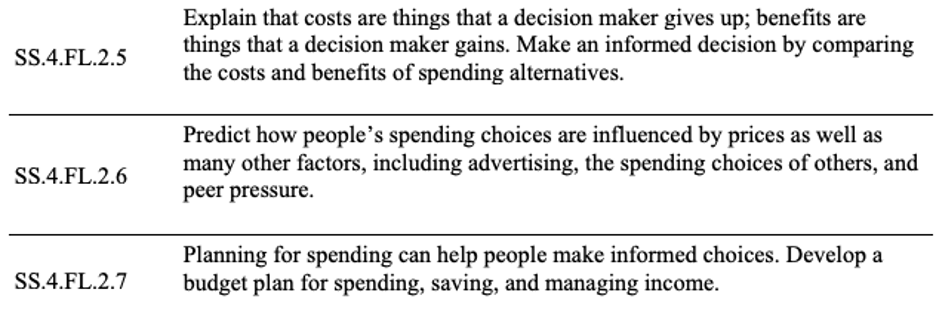History Standards Overlook A Large Part of Florida History — That’s On Purpose
When Florida’s State Board of Education adopted African American History Standards in July 2023, there was worldwide condemnation of one standard that spoke to the “benefits” to enslaved people.
As bad as that one standard is, the standards in their entirety present an equally biased and ahistorical version of America’s past. Let’s take a deep dive into Florida’s African American History Standards.
Elementary Standards: No Critical Thinking Required
One of the ways these standards fail students is they don’t allow our students to think critically and be curious about their histories. Educators know that the most important part of any standard is the verb because that explains what the students should be able to do. For example, take a look at some fourth-grade finance literacy standards (figure 1). Students are asked to “discuss,” “explain,” “predict,” and “develop.” These are the types of cognitive tasks that should be asked of fourth-grade students and help them fully master the subject they are learning.

Now, contrast that with the sole fourth-grade standard in African American History (figure 2) where students are merely asked to “identify” meaning that if a student can simply pick a famous Black person out of a lineup, they will have demonstrated mastery of the standard.

To really drive this point home, look at a fourth-grade standard on the exploration and settlement of Florida (figure 3). You’ll notice that students are asked to not only “identify” explorers, but also dive into the potential motivations of those explorers.

It would have been easy to similarly bulk up the African American History Standards. Students could have been required both identify famous Black people and to explain their contributions.
The good news is that undoubtedly, elementary school teachers across our state are going beyond the standard. Many are asking their students not only to “identify” Zora Neale Hurston, but also the contributions she made to Florida. As one educator put it, “I don’t teach predicated on fear…I have an obligation to the profession to teach objectively and I have an obligation to my students to teach the truth. I do both.”
The bad news is the reality remains that the state of Florida does not require any depth of understanding when it comes to the K-4 standards for African American History. This is just one way in which the standards fall far short of what Florida’s students need and deserve.
Middle School Standards: Ignoring Centuries of History
At the meeting where the standards were formally adopted, a common refrain from supporters was that the standards were “complete” and that there was “nothing missing.” However, that statement is at odds with state law that requires teaching “the history of African peoples before the political conflicts that led to the development of slavery.”
That is why the Commissioner of Education’s African American History Task Force recommended that students in grade 3-5 focus on how “Ancient Africa influenced the rest of the world.” However, that recommendation was ignored by the workgroup who wrote the standards.
The exclusion of Ancient Africa also extends to all fourteen African American History standards in middle school. The only standard that requires instruction prior to the development of the Atlantic slave trade focuses on “trade routes,” not on the people of Africa.
Leaving out the rich history of Africa before the slave trade is what leads to erroneous standards like the now infamous “instruction includes how slaves developed skills which, in some instances, could be applied for their personal benefit.”
To defend this horrendous statement, the FLDOE would often point to famous blacksmiths who were enslaved. But these defenses got things backwards. Africans were not stolen from their homeland and then taught blacksmithing in colonial America. Instead, “blacksmiths were often specifically targeted by slavers for their skills to transport them to other colonies, like the Americas” as pointed out in this NPR article about an exhibit at the National Museum of African Art dedicated to the art of African blacksmiths.
This is precisely why it is so important Florida students know the truth about Ancient Africa and that those students have teachers with the courage to teach the truth. Teachers like Jorge Botello who makes sure his students know the “real story is that people were brought over by force because of their skill sets.”
As if it were not bad enough that the middle school standards ignore the rich history of Africa before the slave trade, the standards also ignore large chunks of modern history. The entire 20th and 21st centuries are missing from the middle school African American History standards.
Middle school students take an End of Course Exam in Civics that counts towards the school grade, yet not a single African American History standard in middle school references anything beyond the end of Reconstruction in the late 1800s.
Critics might argue that African American History is touched on in Civics standards such as the one that requires students to recognize “landmark Supreme court decisions.” But this argument falls flat. It is a disservice for students in Florida to learn about Brown v. Board of Education without also learning about Florida’s history of interposition and nullification. In large parts of Florida, schools remained segregated for a full decade or more after the Brown v. Board decision. To this very day, tens of thousands of Florida students attend schools that remain under federal desegregation orders. All students in Florida deserve to learn that Florida’s long, ugly history of racism in public education did not end with Brown v. Board.
Because Florida’s teachers are committed to teaching the truth just as Botello does, many students will learn about Florida’s history of racism and the impact that legacy still has today. But, with the standards currently in place, students are not required to learn the truth. The middle school African American History standards do a disservice to all students since the standards are limited to such a narrow period of time. That the middle school standards start and end with slavery makes them wholly incomplete.
High School Standards: Following a Pattern of Omission
The high school standards do at least make it into the 20th century. However, as with the elementary and middle school standards, the high school standards omit significant historical details. Students are never asked to examine Florida’s articles of secession, for example. The high school standards are also, at times, downright inflammatory.
Before looking at the high school standards, though, it’s important to understand where they are, and more importantly, are not taught. A part of the process of adopting any set of new standards is assigning the standards to specific courses.
This ensures all the standards are covered and helps to avoid duplication. Analyzing the causes of the Vietnam War, for instance, is a part of United States History courses and not World History courses. Again, tying standards to specific courses ensures there is no ambiguity as to which course a student is expected to master the standard.
The African American history standards appear in neither United States History nor World History courses. Nor are they found in U.S. Government or in Economics. Not a single high school African American history standard is associated with a social studies class that is required for graduation.

Instead, the standards are relegated to elective courses—primarily African American History courses as seen in the image above (figure 4). The latest enrollment data shows that there are 8,088 students statewide enrolled in an African American History course. This means that less than 1% of the 861,603 high school students in Florida are currently enrolled in a course that has African American history standards associated with them. In total, more than 40 counties do not currently have a single student enrolled in an African American History Course.
Now that we’ve established which courses have African American history standards assigned to them, let’s get back to the standards themselves.
The Ocoee Massacre is a stain on Florida’s history. In November 1920, dozens of Black residents of Ocoee were killed, and hundreds were run out of town by members of the KKK who were determined to keep Black people from exercising their right to vote.
This massacre receives only one mention in the high school standards. Inconceivably, the sole standard on the Ocoee Massacre references “acts of violence perpetrated against and by African Americans.” To be clear the Ocoee Massacre was solely an attack against African Americans, not by them. Descendents of survivors of the massacre have rightfully condemned this standard for being “poisoned” and for “spreading misinformation.”
There was righteous anger in Florida and indeed around the nation when Florida adopted its new set of African American history standards, with much of it focused on the one middle school standard regarding the “benefits” to enslaved peoples. But, the flaws with the standards go far beyond what made it in newspaper headlines.
At the Florida Education Association, we are committed to ensuring every child receives an education that is honest, complete, and provides them with the knowledge they need to reckon with our past and create a better future. We will keep exposing the weaknesses and downright inaccuracies in these standards until they are fixed and they become worthy of Florida’s students, educators, and school communities.
Additional Resources
- A better future requires honest, open teaching of African American history (Southern Poverty Law Center)
- Erasing Black History? These Unions Say Not on Their Watch (Word In Black)
- Politicians Restrict the Freedom to Learn on Purpose. What Can We Do? (FEA Advocate, Fall 2024)
- 70 Years Since Brown vs. Borad of Education (FEA eAdvocate post)
